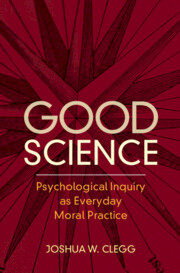Part III - Charting the Moral Geography of Psychological Research
Published online by Cambridge University Press: 06 January 2022
Summary
My argument so far has been that the scientistic, objectivist, and instrumentalist view of science displaces research from its real moral context and thus not only misrepresents the activities of research but, more importantly, can compromise our capacity as psychological researchers to fulfill the responsibilities inherent in our work. I have suggested a different view of science, one that takes scientific activity to be a fundamentally moral and hermeneutic endeavor; one where various social constraints and processes frame a narrative and persuasive activity, defined by a texture of personal, relational, and institutional commitments.
- Type
- Chapter
- Information
- Good SciencePsychological Inquiry as Everyday Moral Practice, pp. 87 - 141Publisher: Cambridge University PressPrint publication year: 2022

